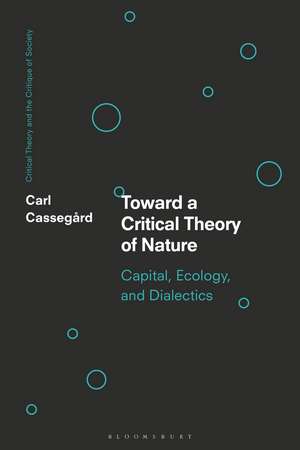Toward a Critical Theory of Nature: Capital, Ecology, and Dialectics: Critical Theory and the Critique of Society
Autor Carl Cassegården Limba Engleză Paperback – 24 aug 2022
| Toate formatele și edițiile | Preț | Express |
|---|---|---|
| Paperback (1) | 198.12 lei 6-8 săpt. | |
| Bloomsbury Publishing – 24 aug 2022 | 198.12 lei 6-8 săpt. | |
| Hardback (1) | 569.37 lei 6-8 săpt. | +121.02 lei 4-10 zile |
| Bloomsbury Publishing – 10 feb 2021 | 569.37 lei 6-8 săpt. | +121.02 lei 4-10 zile |
Preț: 198.12 lei
Preț vechi: 258.06 lei
-23% Nou
Puncte Express: 297
Preț estimativ în valută:
37.91€ • 39.69$ • 31.37£
37.91€ • 39.69$ • 31.37£
Carte tipărită la comandă
Livrare economică 08-22 aprilie
Preluare comenzi: 021 569.72.76
Specificații
ISBN-13: 9781350213999
ISBN-10: 1350213993
Pagini: 256
Ilustrații: 10 bw illus
Dimensiuni: 156 x 234 x 18 mm
Greutate: 0.36 kg
Editura: Bloomsbury Publishing
Colecția Bloomsbury Academic
Seria Critical Theory and the Critique of Society
Locul publicării:London, United Kingdom
ISBN-10: 1350213993
Pagini: 256
Ilustrații: 10 bw illus
Dimensiuni: 156 x 234 x 18 mm
Greutate: 0.36 kg
Editura: Bloomsbury Publishing
Colecția Bloomsbury Academic
Seria Critical Theory and the Critique of Society
Locul publicării:London, United Kingdom
Caracteristici
Offers critical discussion of recent cultural currents and movements, especially in relation to ideas such as the "Anthropocene" and the apocalypse/postapocalypse in environmental activism
Notă biografică
Carl Cassegård is Professor in the Department of Sociology and Work Science at The University of Gothenburg, Sweden, where he is currently researching environmental activism.
Cuprins
Preface1. Introduction: What is a critical theory of nature? 2: Marx's three materialisms 3: Natural history and the primacy of the object 4: Capitalism and the domination of nature 5: Marx, value and nature 6: Constellations and natural science 7: Eco-Marxism's return to Marx 8. World-ecology and the persistence of non-Cartesian dualism9: New materialism and dark ecology 10: Utopia, the apocalypse and praxis References
Recenzii
While the Dialectic of Enlightenment is often dismissed for its supposed pessimistic dead-end, this book shows how Adorno's approach allows one to scrutinize environmental catastrophes in a critical and reflexive manner while highlighting the political and ethical implications contained therein.
Catastrophic climate events are already happening. Cassegård finds in Adorno a critical theory of nature that highlights our destructive behaviour even as it reminds us that we are part of the nature that we are destroying. He asks us to struggle on the side of nature to tame capitalism.
Cassegård's work represents an important correction in a debate that knows so little about critical theory.
Catastrophic climate events are already happening. Cassegård finds in Adorno a critical theory of nature that highlights our destructive behaviour even as it reminds us that we are part of the nature that we are destroying. He asks us to struggle on the side of nature to tame capitalism.
Cassegård's work represents an important correction in a debate that knows so little about critical theory.










